Thomas James Richards, Diaries, Transcript Vol. 3, 26 January to 8 November 1916 - Part 18
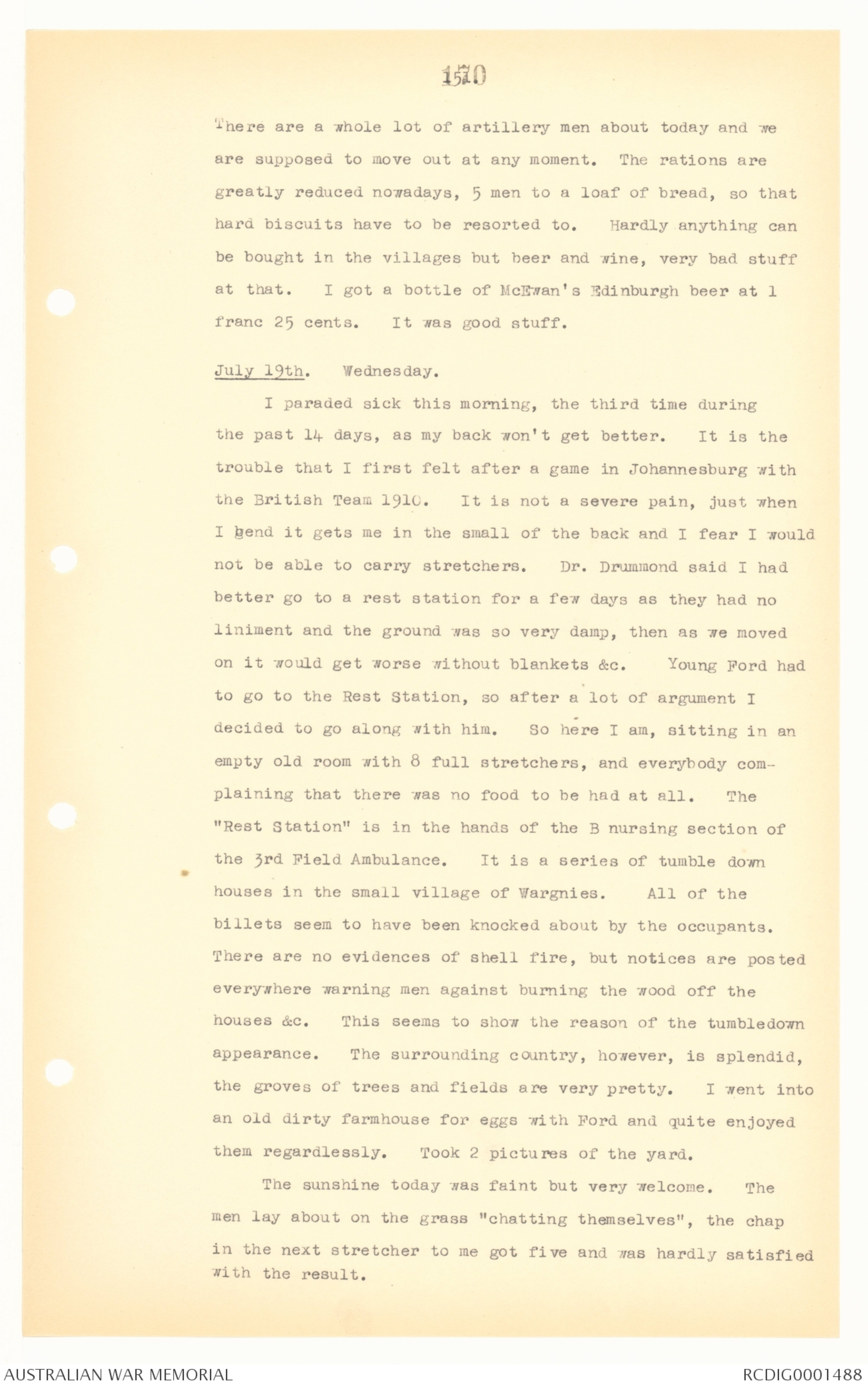
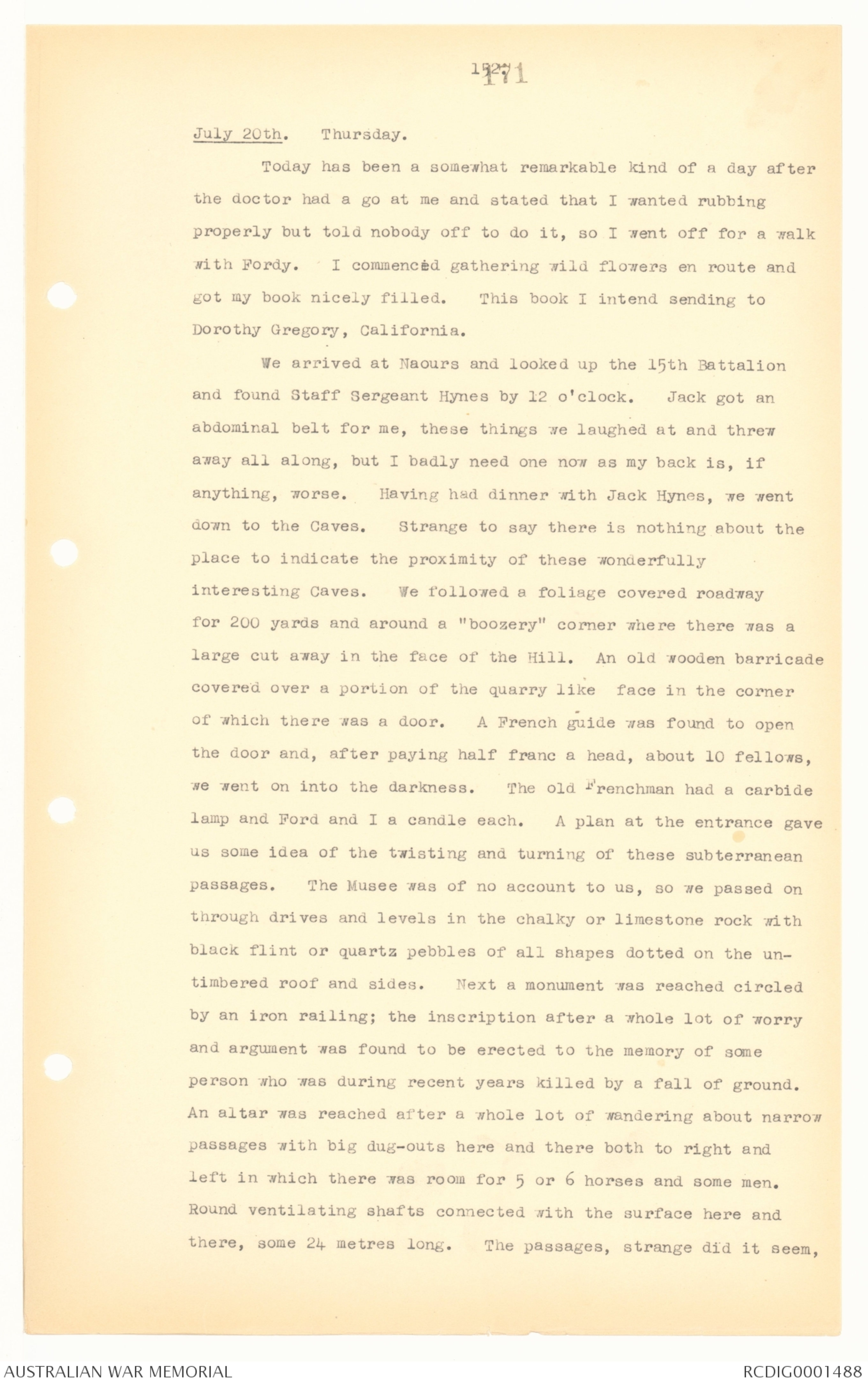
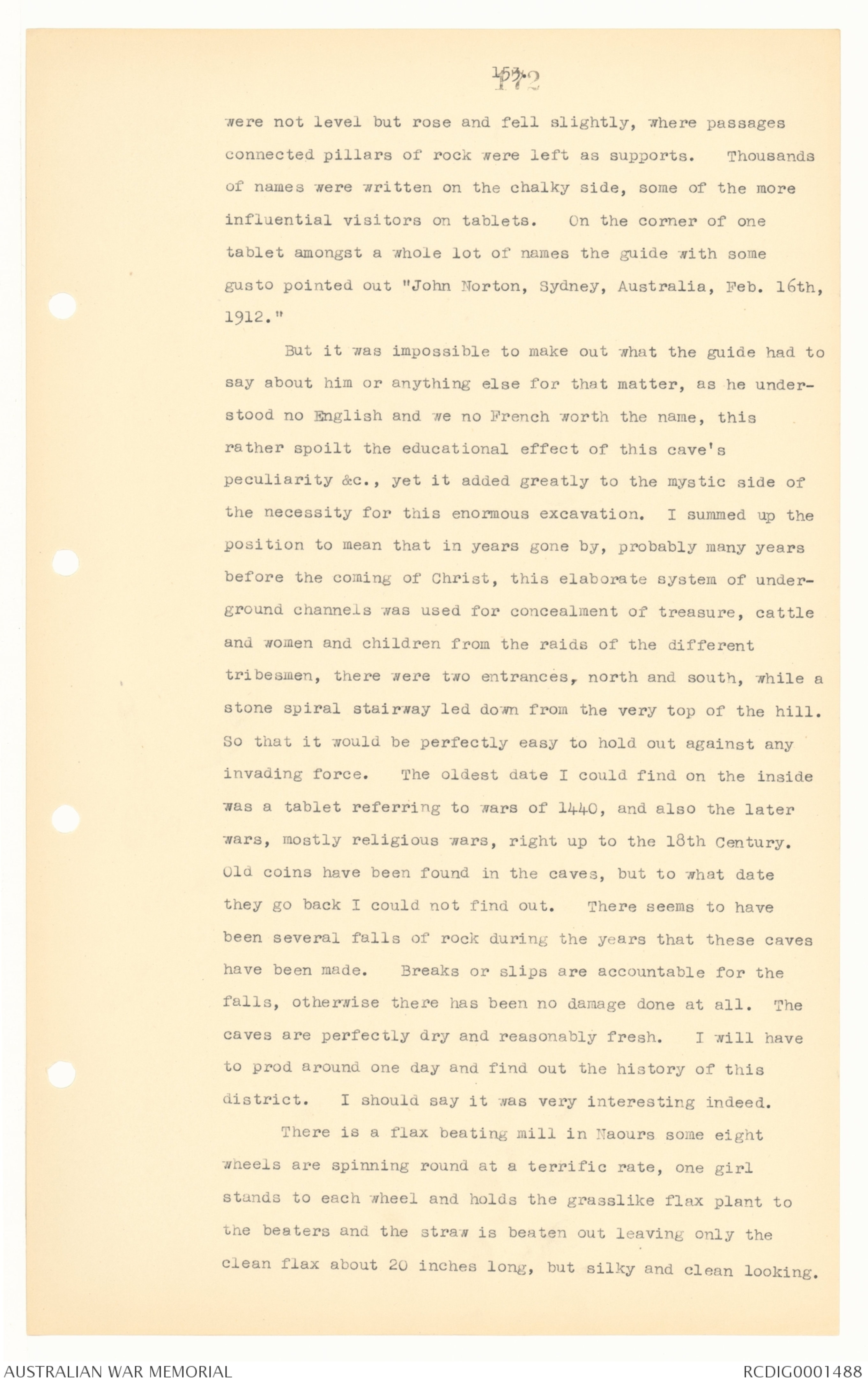
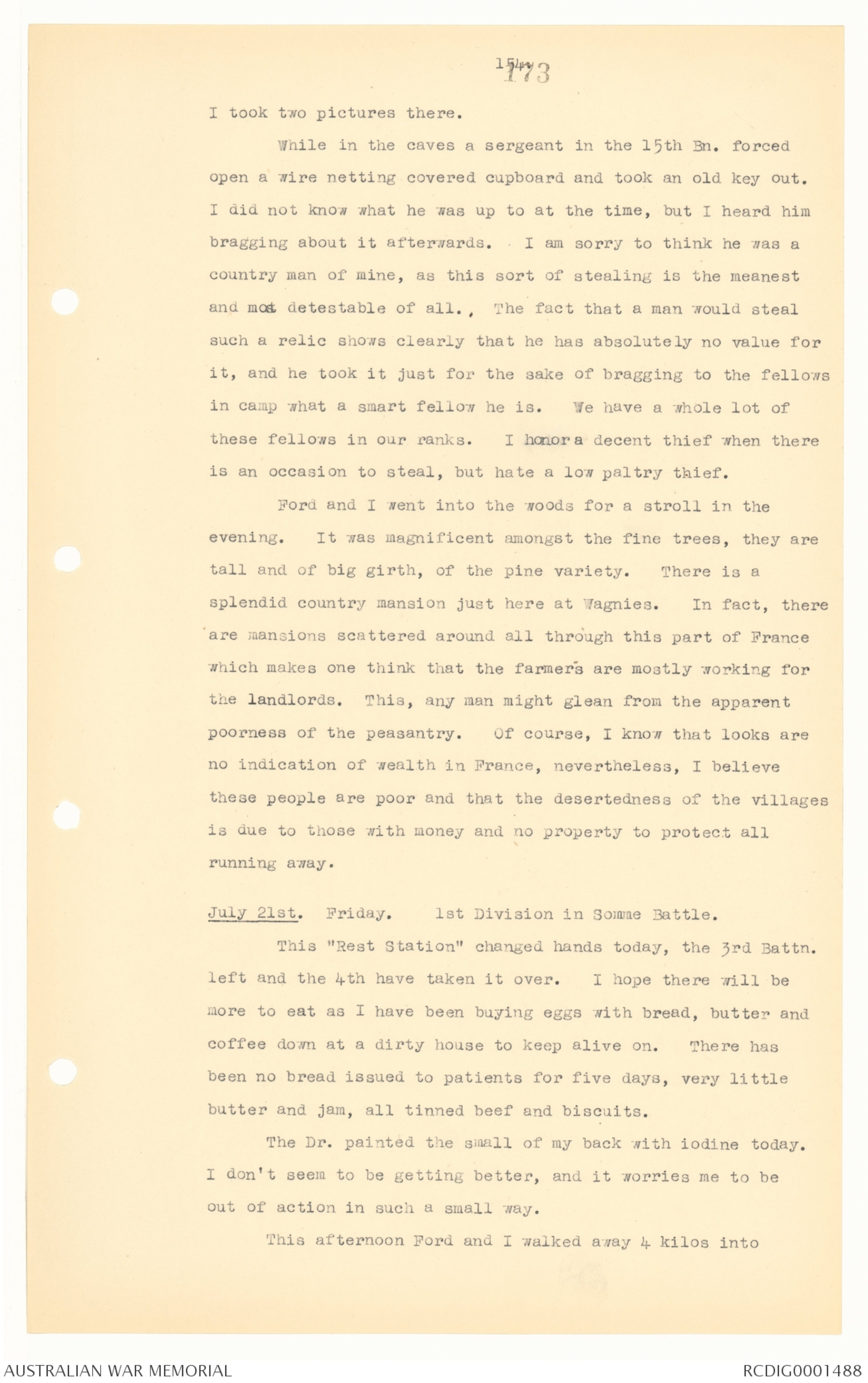
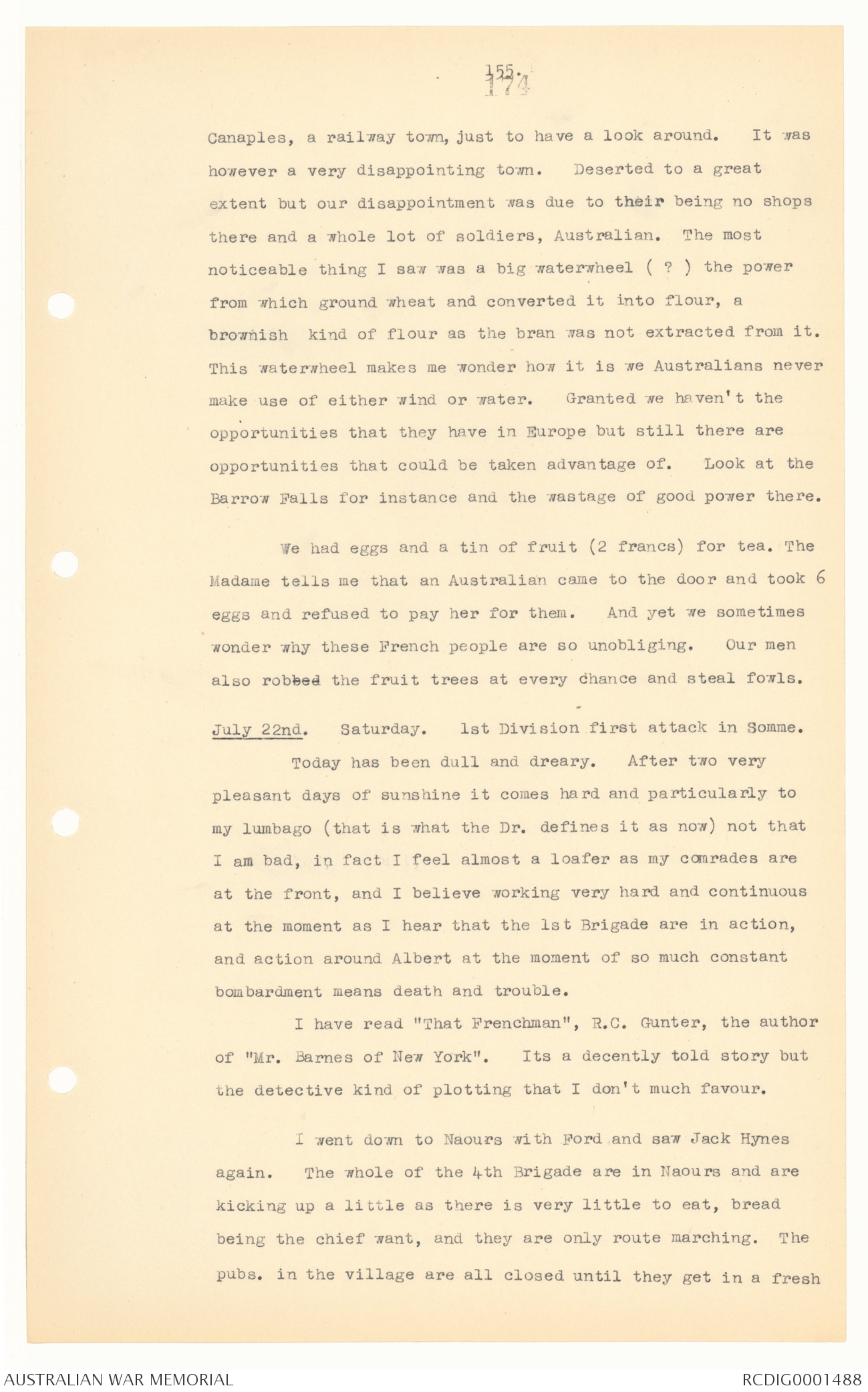
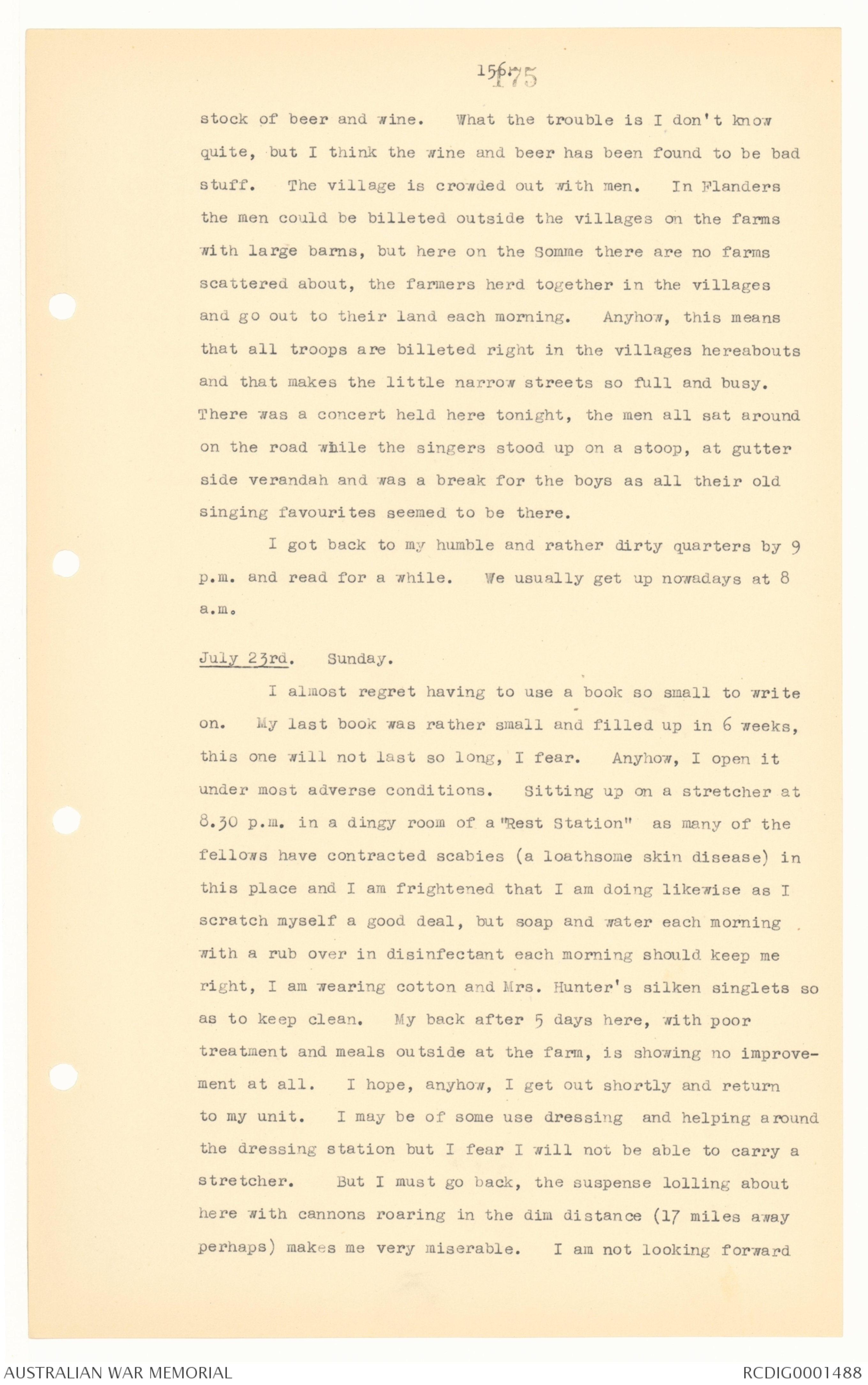
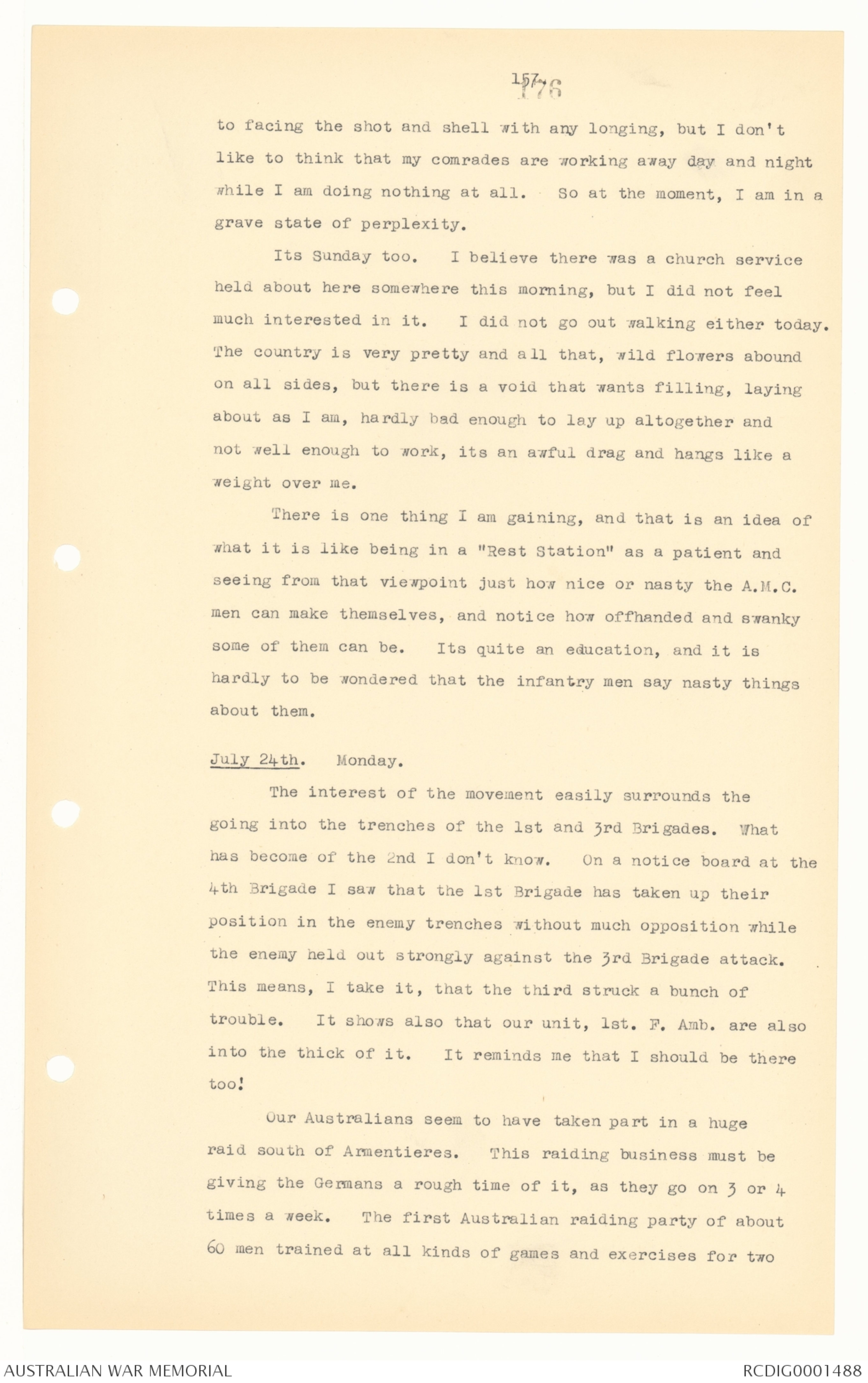
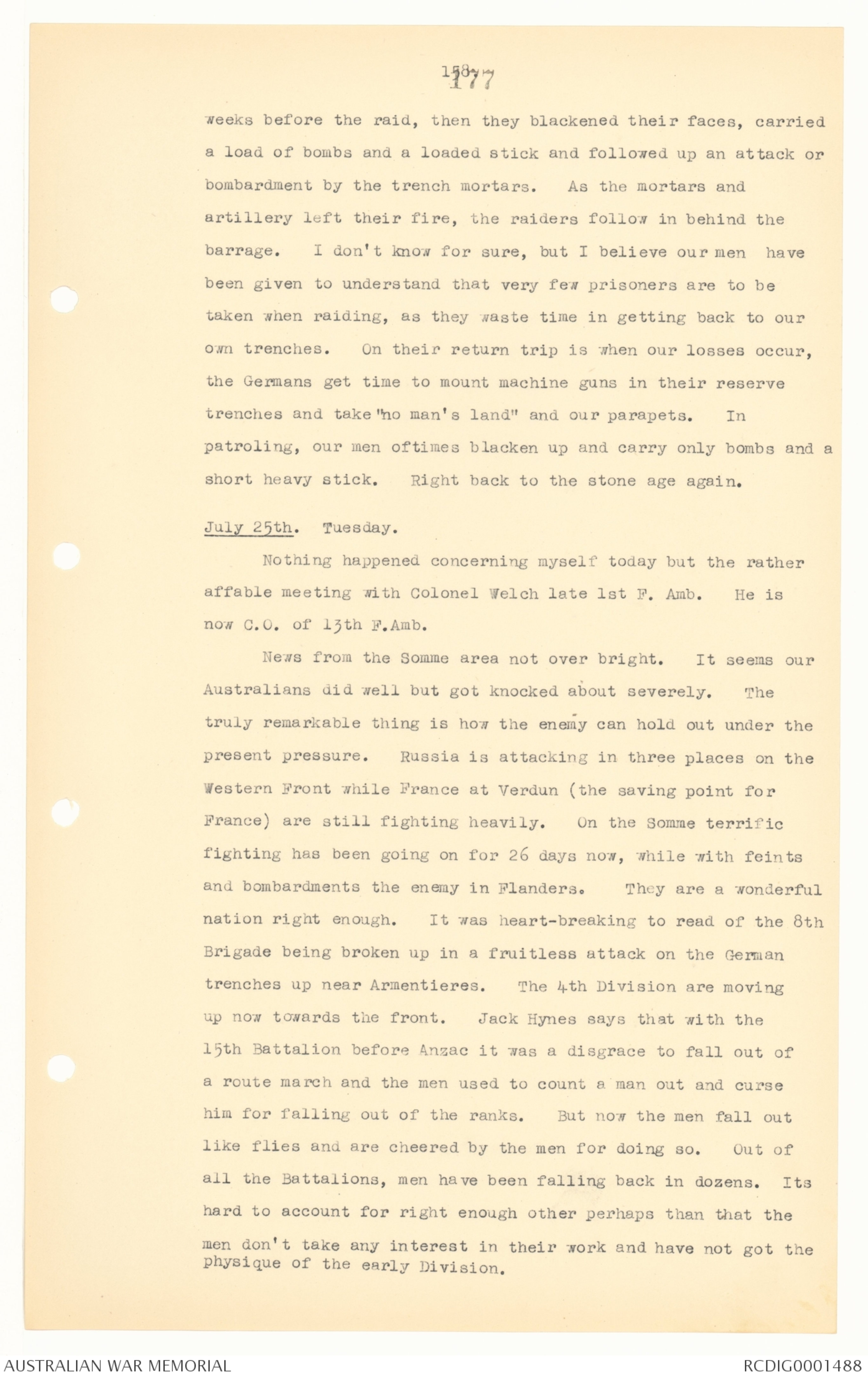
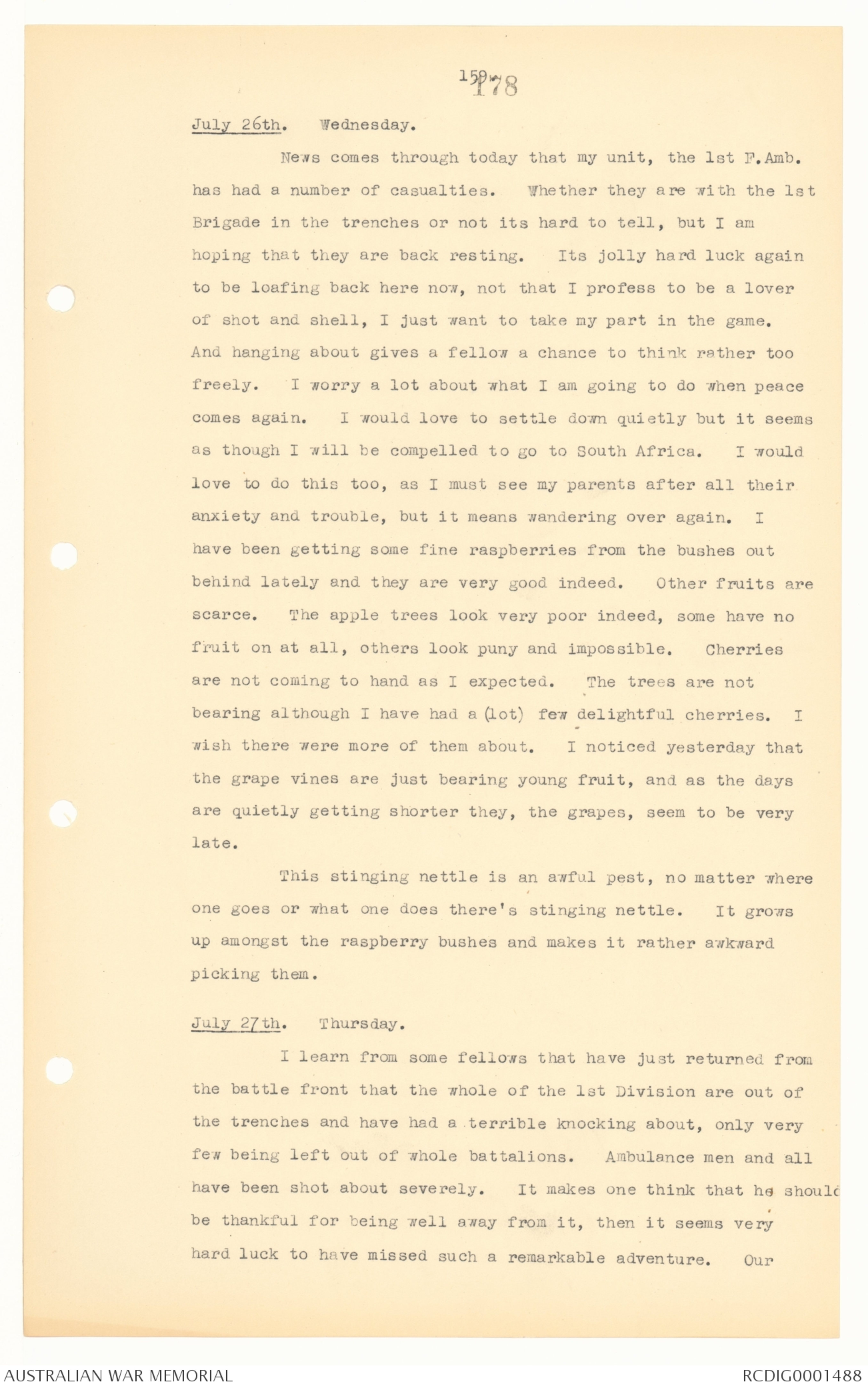
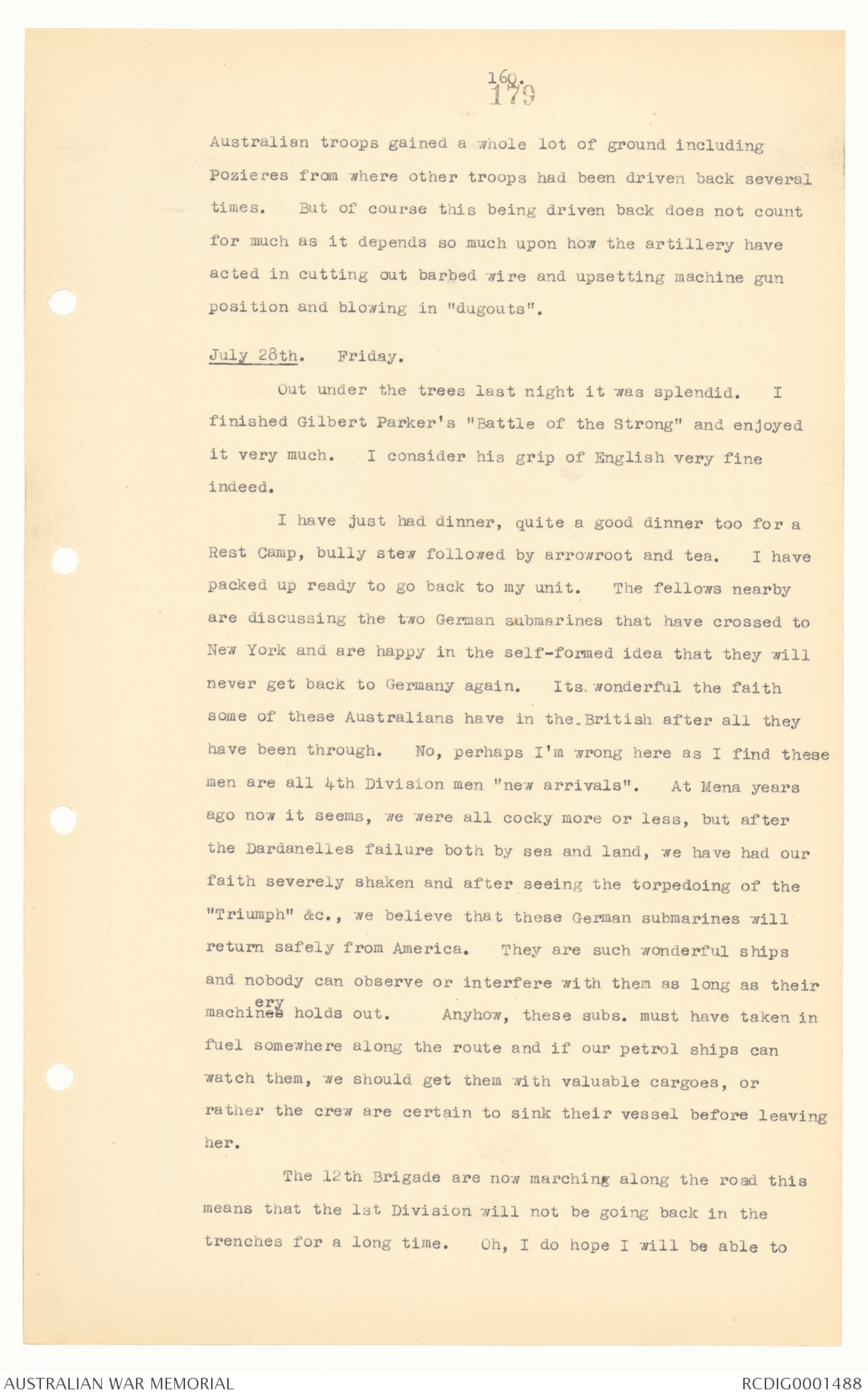
151. 170
There are a whole lot of artillery men about today and we
are supposed to move out at any moment. The rations are
greatly reduced nowadays, 5 men to a loaf of bread, so that
hard biscuits have to be resorted to. Hardly anything can
be bought in the villages but beer and wine, very bad stuff
at that. I got a bottle of McEwan's Edinburgh beer at 1
franc 25 cents. It was good stuff.
July 19th. Wednesday.
I paraded sick this morning, the third time during
the past 14 days, as my back won't get better. It is the
trouble that I first felt after a game in Johannesburg with
the British Team 1910. It is not a severe pain, just when
I bend it gets me in the small of the back and I fear I would
not be able to carry stretchers. Dr. Drummond said I had
better go to a rest station for a few days as they had no
liniment and the ground was so very damp, then as we moved
on it would get worse without blankets &c. Young Ford had
to go to the Rest Station, so after a lot of argument I
decided to go along with him. So here I am, sitting in an
empty old room with 8 full stretchers, and everybody complaining
that there was no food to be had at all. The
"Rest Station" is in the hands of the B nursing section of
the 3rd Field Ambulance. It is a series of tumble down
houses in the small village of Wargnies. All of the
billets seem to have been knocked about by the occupants.
There are no evidences of shell fire, but notices are posted
everywhere warning men against burning the wood off the
houses &c. This seems to show the reason of the tumbledown
appearance. The surrounding country, however, is splendid,
the groves of trees and fields are very pretty. I went into
an old dirty farmhouse for eggs with Ford and quite enjoyed
them regardlessly. Took 2 pictures of the yard.
The sunshine today was faint but very welcome. The
men lay about on the grass "chatting themselves", the chap
in the next stretcher to me got five and was hardly satisfied
with the result.
152. 171
July 20th. Thursday.
Today has been a somewhat remarkable kind of a day after
the doctor had a go at me and stated that I wanted rubbing
properly but told nobody off to do it, so I went off for a walk
with Fordy. I commenced gathering wild flowers en route and
got my book nicely filled. This book I intend sending to
Dorothy Gregory, California.
We arrived at Naours and looked up the 15th Battalion
and found Staff Sergeant Hynes by 12 o'clock. Jack got an
abdominal belt for me, these things we laughed at and threw
away all along, but I badly need one now as my back is, if
anything, worse. Having had dinner with Jack Hynes, we went
down to the Caves. Strange to say there is nothing about the
place to indicate the proximity of these wonderfully
interesting Caves. We followed a foliage covered roadway
for 200 yards and around a "boozery" corner where there was a
large cut away in the face of the Hill. An old wooden barricade
covered over a portion of the quarry like face in the corner
of which there was a door. A French guide was found to open
the door and, after paying half franc a head, about 10 fellows,
we went on into the darkness. The old Frenchman had a carbide
lamp and Ford and I a candle each. A plan at the entrance gave
us some idea of the twisting and turning of these subterranean
passages. The Musee was of no account to us, so we passed on
through drives and levels in the chalky or limestone rock with
black flint or quartz pebbles of all shapes dotted on the untimbered
roof and sides. Next a monument was reached circled
by an iron railing; the inscription after a whole lot of worry
and argument was found to be erected to the memory of some
person who was during recent years killed by a fall of ground.
An altar was reached after a whole lot of wandering about narrow
passages with big dug-outs here and there both to right and
left in which there was room for 5 or 6 horses and some men.
Round ventilating shafts connected with the surface here and
there, some 24 metres long. The passages, strange did it seem,
153. 172
were not level but rose and fell slightly, where passages
connected pillars of rock were left as supports. Thousands
of names were written on the chalky side, some of the more
influential visitors on tablets. On the corner of one
tablet amongst a whole lot of names the guide with some
gusto pointed out "John Norton, Sydney, Australia, Feb. 16th,
1912."
But it was impossible to make out what the guide had to
say about him or anything else for that matter, as he understood
no English and we no French worth the name, this
rather spoilt the educational effect of this cave's
peculiarity &c., yet it added greatly to the mystic side of
the necessity for this enormous excavation. I summed up the
position to mean that in years gone by, probably many years
before the coming of Christ, this elaborate system of underground
channels was used for concealment of treasure, cattle
and women and children from the raids of the different
tribesmen, there were two entrances, north and south, while a
stone spiral stairway led down from the very top of the hill.
So that it would be perfectly easy to hold out against any
invading force. The oldest date I could find on the inside
was a tablet referring to wars of 1440, and also the later
wars, mostly religious wars, right up to the 18th Century.
Old coins have been found in the caves, but to what date
they go back I could not find out. There seems to have
been several falls of rock during the years that these caves
have been made. Breaks or slips are accountable for the
falls, otherwise there has been no damage done at all. The
caves are perfectly dry and reasonably fresh. I will have
to prod around one day and find out the history of this
district. I should say it was very interesting indeed.
There is a flax beating mill in Naours some eight
wheels are spinning round at a terrific rate, one girl
stands to each wheel and holds the grasslike flax plant to
the beaters and the straw is beaten out leaving only the
clean flax about 20 inches long, but silky and clean looking.
154. 173
I took two pictures there.
While in the caves a sergeant in the 15th Bn. forced
open a wire netting covered cupboard and took an old key out.
I did not know what he was up to at the time, but I heard him
bragging about it afterwards. I am sorry to think he was a
country man of mine, as this sort of stealing is the meanest
and most detestable of all., The fact that a man would steal
such a relic shows clearly that he has absolutely no value for
it, and he took it just for the sake of bragging to the fellows
in camp what a smart fellow he is. We have a whole lot of
these fellows in our ranks. I honor a decent thief when there
is an occasion to steal, but hate a low paltry thief.
Ford and I went into the woods for a stroll in the
evening. It was magnificent amongst the fine trees, they are
tall and of big girth, of the pine variety. There is a
splendid country mansion just here at Wagnies. In fact, there
are mansions scattered around all through this part of France
which makes one think that the farmers are mostly working for
the landlords. This, any man might glean from the apparent
poorness of the peasantry. Of course, I know that looks are
no indication of wealth in France, nevertheless, I believe
these people are poor and that the desertedness of the villages
is due to those with money and no property to protect all
running away.
July 21st. Friday. 1st Division in Somme Battle.
This "Rest Station" changed hands today, the 3rd Battn.
left and the 4th have taken it over. I hope there will be
more to eat as I have been buying eggs with bread, butter and
coffee down at a dirty house to keep alive on. There has
been no bread issued to patients for five days, very little
butter and jam, all tinned beef and biscuits.
The Dr. painted the small of my back with iodine today.
I don't seem to be getting better, and it worries me to be
out of action in such a small way.
This afternoon Ford and I walked away A kilos into
155. 174
Canaples, a railway town, just to have a look around. It was
however a very disappointing town. Deserted to a great
extent but our disappointment was due to their being no shops
there and a whole lot of soldiers, Australian. The most
noticeable thing I saw was a big waterwheel (?) the power
from which ground wheat and converted it into flour, a
brownish kind of flour as the bran was not extracted from it.
This waterwheel makes me wonder how it is we Australians never
make use of either wind or water. Granted we haven't the
opportunities that they have in Europe but still there are
opportunities that could be taken advantage of. Look at the
Barrow Falls for instance and the wastage of good power there.
We had eggs and a tin of fruit (2 francs) for tea. The
Madame tells me that an Australian came to the door and took 6
eggs and refused to pay her for them. And yet we sometimes
wonder why these French people are so unobliging. Our men
also robbed the fruit trees at every chance and steal fowls.
July 22nd. Saturday. 1st Division first attack in Somme.
Today has been dull and dreary. After two very
pleasant days of sunshine it comes hard and particularly to
my lumbago (that is what the Dr. defines it as now) not that
I am bad, in fact I feel almost a loafer as my comrades are
at the front, and I believe working very hard and continuous
at the moment as I hear that the 1st Brigade are in action,
and action around Albert at the moment of so much constant
bombardment means death and trouble.
I have read "That Frenchman", R.C. Gunter, the author
of "Mr. Barnes of New York". Its a decently told story but
the detective kind of plotting that I don’t much favour.
I went down to Naours with Ford and saw Jack Hynes
again. The whole of the 4th Brigade are in Naours and are
kicking up a little as there is very little to eat, bread
being the chief want, and they are only route marching. The
pubs. in the village are all closed until they get in a fresh
156. 175
stock of beer and wine.
What the trouble is I don't know
quite, but I think the wine and beer has been found to be bad
stuff. The village is crowded out with men. In Flanders
the men could be billeted outside the villages on the farms
with large barns, but here on the Somme there are no farms
scattered about, the farmers herd together in the villages
and go out to their land each morning. Anyhow, this means
that all troops are billeted right in the villages hereabouts
and that makes the little narrow streets so full and busy.
There was a concert held here tonight, the men all sat around
on the road while the singers stood up on a stoop, at gutter
side verandah and was a break for the boys as all their old
singing favourites seemed to be there.
I got back to my humble and rather dirty quarters by 9
p.m. and read for a while. We usually get up nowadays at 8
a.m.
July 23rd. Sunday.
I almost regret having to use a book so small to write
on. My last book was rather small and filled up in 6 weeks,
this one will not last so long, I fear. Anyhow, I open it
under most adverse conditions. Sitting up on a stretcher at
8.30 p.m. in a dingy room of a 'Rest Station", as many of the
fellows have contracted scabies (a loathsome skin disease) in
this place and I am frightened that I am doing likewise as I
scratch myself a good deal, but soap and water each morning
with a rub over in disinfectant each morning should keep me
right, I am wearing cotton and Mrs. Hunter's silken singlets so
as to keep clean. My back after 5 days here, with poor
treatment and meals outside at the farm, is showing no improvement
at all. I hope, anyhow, I get out shortly and return
to my unit. I may be of some use dressing and helping around
the dressing station but I fear I will not be able to carry a
stretcher. But I must go back, the suspense lolling about
here with cannons roaring in the dim distance (17 miles away
perhaps) makes me very miserable. I am not looking forward
157. 176
to facing the shot and shell with any longing, but I don't
like to think that my comrades are working away day and night
while I am doing nothing at all. So at the moment, I am in a
grave state of perplexity.
Its Sunday too. I believe there was a church service
held about here somewhere this morning, but I did not feel
much interested in it. I did not go out walking either today.
The country is very pretty and all that, wild flowers abound
on all sides, but there is a void that wants filling, laying
about as I am, hardly bad enough to lay up altogether and
not well enough to work, its an awful drag and hangs like a
weight over me.
There is one thing I am gaining, and that is an idea of
what it is like being in a "Rest Station" as a patient and
seeing from that viewpoint just how nice or nasty the A.M.C.
men can make themselves, and notice how offhanded and swanky
some of them can be. Its quite an education, and it is
hardly to be wondered that the infantry men say nasty things
about them.
July 24th. Monday.
The interest of the movement easily surrounds the
going into the trenches of the 1st and 3rd Brigades. What
has become of the 2nd I don’t know. On a notice board at the
4th Brigade I saw that the 1st Brigade has taken up their
position in the enemy trenches without much opposition while
the enemy held out strongly against the 3rd Brigade attack.
This means, I take it, that the third struck a bunch of
trouble. It shows also that our unit, 1st. F. Amb. are also
into the thick of it. It reminds me that I should be there
too!
Our Australians seem to have taken part in a huge
raid south of Armentieres. This raiding business must be
giving the Germans a rough time of it, as they go on 3 or 4
times a week. The first Australian raiding party of about
60 men trained at all kinds of games and exercises for two
158. 177
weeks before the raid, then they blackened their faces, carried
a load of bombs and a loaded stick and followed up an attack or
bombardment by the trench mortars. As the mortars and
artillery left their fire, the raiders follow in behind the
barrage. I don't know for sure, but I believe our men have
been given to understand that very few prisoners are to be
taken when raiding, as they waste time in getting back to our
own trenches. On their return trip is when our losses occur,
the Germans get time to mount machine guns in their reserve
trenches and take "no man's land" and our parapets. In
patroling, our men oftimes blacken up and carry only bombs and a
short heavy stick. Right back to the stone age again.
July 25th. Tuesday.
Nothing happened concerning myself today but the rather
affable meeting with Colonel Welch late 1st F. Amb. He is
now C.O. of 13th F.Amb.
News from the Somme area not over bright. It seems our
Australians did well but got knocked about severely. The
truly remarkable thing is how the enemy can hold out under the
present pressure. Russia is attacking in three places on the
Western Front while France at Verdun (the saving point for
France) are still fighting heavily. On the Somme terrific
fighting has been going on for 26 days now, while with feints
and bombardments the enemy in Flanders. They are a wonderful
nation right enough. It was heart-breaking to read of the 8th
Brigade being broken up in a fruitless attack on the German
trenches up near Armentieres. The 4th Division are moving
up now towards the front. Jack Hynes says that with the
15th Battalion before Anzac it was a disgrace to fall out of
a route march and the men used to count a man out and curse
him for falling out of the ranks. But now the men fall out
like flies and are cheered by the men for doing so. Out of
all the Battalions, men have been falling back in dozens. Its
hard to account for right enough other perhaps than that the
men don't take any interest in their work and have not got the
physique of the early Division.
159. 178
July 26th. Wednesday.
News comes through today that my unit, the 1st F.Amb.
has had a number of casualties. Whether they are with the 1st
Brigade in the trenches or not its hard to tell, but I am
hoping that they are back resting. Its jolly hard luck again
to be loafing back here now, not that I profess to be a lover
of shot and shell, I just want to take my part in the game.
And hanging about gives a fellow a chance to think rather too
freely. I worry a lot about what I am going to do when peace
comes again. I would love to settle down quietly but it seems
as though I will be compelled to go to South Africa. I would
love to do this too, as I must see my parents after all their
anxiety and trouble, but it means wandering over again. I
have been getting some fine raspberries from the bushes out
behind lately and they are very good indeed. Other fruits are
scarce. The apple trees look very poor indeed, some have no
fruit on at all, others look puny and impossible. Cherries
are not coming to hand as I expected. The trees are not
bearing although I have had a (lot) few delightful cherries. I
wish there were more of them about. I noticed yesterday that
the grape vines are just bearing young fruit, and as the days
are quietly getting shorter they, the grapes, seem to be very
late.
This stinging nettle is an awful pest, no matter where
one goes or what one does there's stinging nettle. It grows
up amongst the raspberry bushes and makes it rather awkward
picking them.
July 27th. Thursday.
I learn from some fellows that have just returned from
the battle front that the whole of the 1st Division are out of
the trenches and have had a terrible knocking about, only very
few being left out of whole battalions. Ambulance men and all
have been shot about severely. It makes one think that he should
be thankful for being well away from it, then it seems very
hard luck to have missed such a remarkable adventure. Our
160. 179
Australian troops gained a whole lot of ground including
Pozieres from where other troops had been driven back several
times. But of course this being driven back does not count
for much as it depends so much upon how the artillery have
acted in cutting out barbed wire and upsetting machine gun
position and blowing in "dugouts".
July 28th. Friday.
Out under the trees last night it was splendid. I
finished Gilbert Parker's "Battle of the Strong" and enjoyed
it very much. I consider his grip of English very fine
indeed.
I have just had dinner, quite a good dinner too for a
Rest Camp, bully stew followed by arrowroot and tea. I have
packed up ready to go back to my unit. The fellows nearby
are discussing the two German submarines that have crossed to
New York and are happy in the self-formed idea that they will
never get back to Germany again. Its wonderful the faith
some of these Australians have in the British after all they
have been through. No, perhaps I'm wrong here as I find these
men are all 4th Division men "new arrivals". At Mena years
ago now it seems, we were all cocky more or less, but after
the Dardanelles failure both by sea and land, we have had our
faith severely shaken and after seeing the torpedoing of the
"Triumph" &c., we believe that these German submarines will
return safely from America. They are such wonderful ships
and nobody can observe or interfere with them as long as their
machinesery holds out. Anyhow, these subs, must have taken in
fuel somewhere along the route and if our petrol ships can
watch them, we should get them with valuable cargoes, or
rather the crew are certain to sink their vessel before leaving
her.
The 12th Brigade are now marching along the road this
means that the 1st Division will not be going back in the
trenches for a long time. Oh, I do hope I will be able to
 Sam scott
Sam scottThis transcription item is now locked to you for editing. To release the lock either Save your changes or Cancel.
This lock will be automatically released after 60 minutes of inactivity.